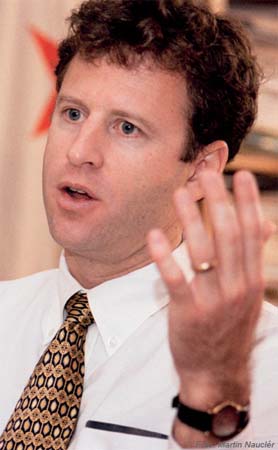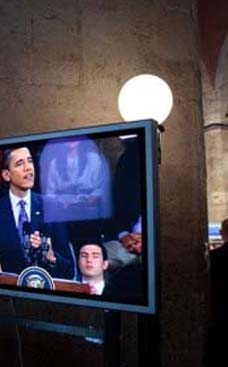
"Austin's story also provides critical lessons for the growing war in Afghanistan. The Iraq experience gives reason for hope that our new focus on protecting the population, while building up indigenous security forces, could be the key to success there, too. As important, of course, is the critical role of human decision-making and leadership in war. This means that though the basic principles might be right, we still need to execute as well as Petraeus, Gen. Ray Odierno, Austin and many Iraqis did in their country." Michael O'Hanlon, a Senior Fellow at the Brookings Institute and a Visiting Lecturer at Princeton University, served as a Peace Corps Volunteer in Congo Kinshasa.
Michael O'Hanlon writes: An unsung hero and great soldier by the name of Lloyd Austin has just finished his tour in Iraq as the No. 2 U.S. commander
A hero you should know
Lloyd Austin is back from Iraq, where he was the No. 2 U.S. commander. His successful tenure says plenty about him — and a bit about Afghanistan.
By Michael O'Hanlon
An unsung hero and great soldier by the name of Lloyd Austin has just finished his tour in Iraq as the No. 2 U.S. commander. The lieutenant general's story deserves attention to honor his service, to understand the situation in Iraq today, and not least to garner key lessons for Afghanistan about the importance of leadership and the need for strong command structures.
Perhaps the best place to begin the story of Austin is early in his tour as operational commander in February 2008. The surge had begun to decrease violence in much of the country, and the Sunni Awakening as well as key U.S.-Iraqi military operations had transformed former allied death traps such as Fallujah and Ramadi. But much of Baghdad, the key oil town of Basra and other crucial regions of the country remained anarchic, with militia extremists — most of them Shiite and most supported by Iran — ruling the streets. Knowing that this had to end, Lt. Gen. Austin and commanding Gen. David Petraeus — who now heads the U.S. Central Command and who, in great admiration for Austin, kindly agreed to be interviewed for this column — started planning a summer offensive in Basra and elsewhere.
But then Iraqi Prime Minister Nouri al-Maliki asked Petraeus to come see him in late March, and in their Sunday morning meeting he announced that the battle of Basra would begin the next day. All the best-laid plans to first establish strongholds, checkpoints, communications webs and support capabilities were discarded. With plenty of chutzpah, but not much else, Iraqi forces were essentially thrust into the city with little on-the-ground intelligence and little backup.
As you might expect, the offensive was initially a catastrophe. Iraqi police melted away; the newly formed 52nd brigade of the Iraqi army, just out of basic training and without any embedded coalition mentoring teams, got bogged down in serious fighting. It appeared — at the price of being indebted to Iran's Quds force thereafter. Meanwhile "special groups" in Sadr City began their most intense barrage ever of Baghdad's Green Zone, driving embassy personnel from their trailers and back onto cots inside fortified buildings.
American commanders really thought the battle might be lost.
Taking control
Into this mess stepped Lt. Gen. Austin. Within 48 hours of the start of the battle of Basra, when even the city's airfield was being pounded, Austin flew in from Baghdad. He promptly established a tactical operations center of some 100 people to gather intelligence, direct air strikes and team up with Iraqi units on the scene. He authorized Marines based in Anbar province to deploy southward with the Iraqi units they were advising. He helped Iraqi leaders modify their previously impulsive battle plan. Within about two weeks, the tide had turned because of a battlefield victory rather than a submissive appeal to Tehran.
Things took longer in Sadr City, involving more U.S. ground forces and, subsequently, more American casualties. Block by block, however, Iraqi/American security units cleared the part of Sadr City closest to Baghdad's center and built a huge concrete wall to seal it off from the rest of the militia strongholds (which were later cleared, too). But as I can attest, having visited Baghdad barely a month later, the turnaround was dramatic.
It's not an overstatement to say that these battles provided a make-or-break moment for the U.S.-led surge of troops into Iraq. In the ensuing months, and even today, Gen. Petraeus has been correctly hailed as the man who led our soldiers back from the brink. Yet as operational commander, Lt. Gen. Austin — even more than Petraeus — was responsible for the detailed decisions necessary to pacify Basra and Sadr City. His vision proved crucial.
As Petraeus put it, Austin was "calm, courageous, decisive, and resolute — even in some very difficult situations."
Why does this matter today? Because of the work of Austin and others like him, al-Qaeda is on its heels in Iraq, Muqtada al-Sadr's violent followers are largely defeated and Iraq's major cities are under government control (with the partial exception of Mosul in the north) for the first time since Saddam Hussein was ousted. There is much work left, to be sure, but Iraq's most perilous moments are probably behind us.
Looking to Afghanistan
Austin's story also provides critical lessons for the growing war in Afghanistan. The Iraq experience gives reason for hope that our new focus on protecting the population, while building up indigenous security forces, could be the key to success there, too. As important, of course, is the critical role of human decision-making and leadership in war. This means that though the basic principles might be right, we still need to execute as well as Petraeus, Gen. Ray Odierno, Austin and many Iraqis did in their country.
Finally, we now know unequivocally that with a challenge as daunting as pre-surge Iraq, or Afghanistan today, the No. 2 person is as critical to operational success as the person in charge. In Iraq during the surge, first Odierno and then Austin played crucial roles as operational commanders. No such person, no such command, exists in Afghanistan today. As effective as Petraeus is, he needed a strong No. 2 to succeed. And as good as Gen. David McKiernan is today in Afghanistan, he is being asked to do too much himself. He needs a similar operational commander — and soon.
Michael O'Hanlon, who has been to Iraq four times since the war began, is a senior fellow at the Brookings Institution in Washington.











